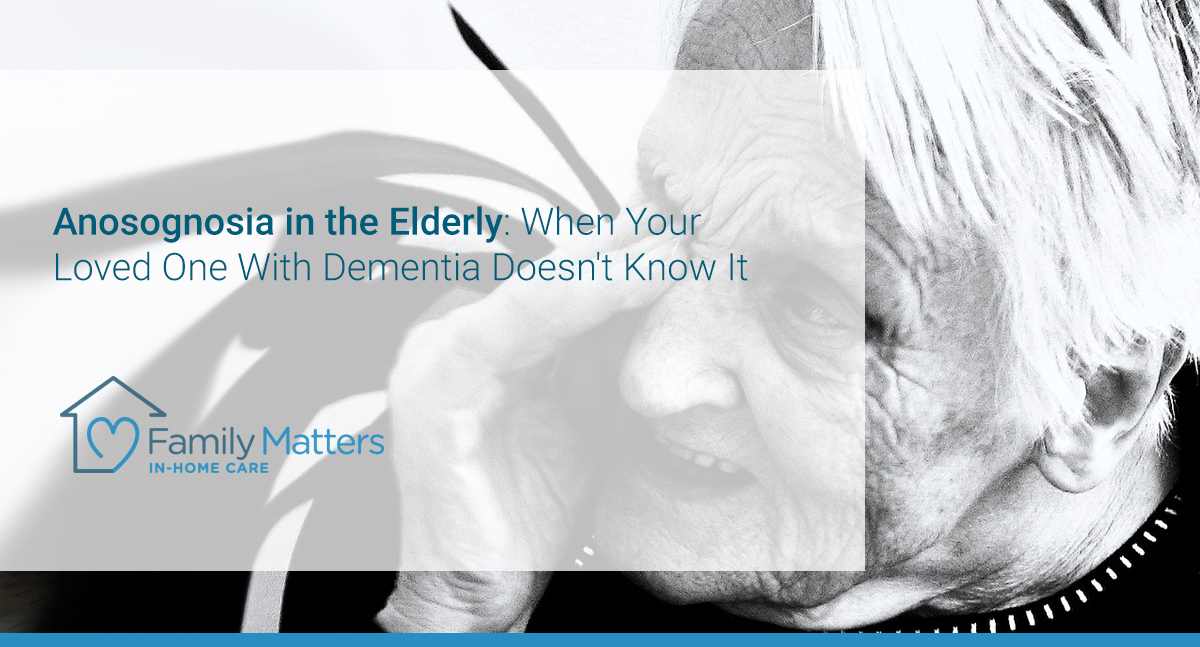
Anosognosia in the Elderly: When Your Loved One with Dementia Doesn’t Know It
Cognitive concerns like dementia are one of the most prevalent issues among senior adults. When a loved one has dementia, they can struggle with memory loss, confusion, insomnia, and mood swings.
In some cases, the disease is diagnosed at an early stage while the patient still maintains certain cognitive abilities and is in denial about their condition. In other instances, the disease has already progressed, and the cognitive issues are too severe for the patient to understand their diagnosis or be aware of what is happening.
It could also be that your loved one initially knew about their diagnosis, but as the disease progressed, they no longer knew or understood what was happening.
This phenomenon is called anosognosia, and it can complicate cognitive concerns like Alzheimer’s disease or dementia. Caring for an elderly loved one who has dementia and does not know it requires special care.
What Is Anosognosia?
Anosognosia is a medical term that refers to people who do not know they have a disease.
When someone has anosognosia, they are unaware of their condition and may not understand why they are experiencing certain symptoms. They may even be completely unaware of their symptoms and not realize anything is out of the ordinary.
Anosognosia and Dementia
Anosognosia most often occurs in patients with severe levels of cognitive decline, such as advanced Alzheimer’s disease or dementia.
In fact, researchers at Unicity Healthcare believe that up to 81% of people with Alzheimer’s disease have anosognosia. These patients are completely unaware of their cognitive concerns and do not understand how their condition affects their daily life or ability to function.
How to Care for Dementia Patients with Anosognosia
When someone with dementia has anosognosia, it can make caring for them more tricky. Since they are unaware of their condition and the way it affects them, their behavior may be completely out of their control.
Caregivers can struggle to navigate this type of care because it requires round-the-clock supervision and various approaches to performing everyday tasks. It can also be hard to work with a loved one who is in denial about their difficulties. The following are just a few helpful tips for caregivers of someone with anosognosia.
Communicate Openly and Honestly
While dementia and other cognitive issues can impact the ability to communicate, it is still important to have an open dialogue with the person you are caring for. Explain to them why you are helping with certain things and why they require that help.
They may be defiant or in denial of their condition upon explanation. This is why the situation should be discussed in a delicate way that does not shame them or make them feel embarrassed.
It may be unlikely that they will understand or remember the information you are giving them, but it is still important that you be honest and open with them about their needs.
Provide Supervision
When someone with dementia has anosognosia, they are essentially in denial of their condition. They do not see, realize, or believe that something is wrong. This leads them to behave in ways that may be unsafe for them.
Some people may attempt to drive a vehicle. Others try to leave the house as they normally would and end up wandering or getting lost. To avoid this, there must be consistent supervision.
There are several ways to provide round-the-clock supervision for someone with dementia. If you act as a personal caregiver, you may want to move into their home or transition them into yours.
If this is not possible, they may need to live in an assisted living home with memory care or have a professional live-in caregiver. This ensures that your loved one remains safe while adapting to their condition.
Make Dignity a Priority
A common concern when caring for someone with dementia is maintaining their dignity. When cognitive abilities decline, most seniors require help with everyday functions like bathing or using the restroom.
If your loved one has anosognosia, they may feel increased anxiety when receiving help with these things. There may be feelings of self-consciousness or embarrassment in these moments.
When helping with these functions, it is important that you make your loved one feel comfortable and relaxed. Approach everything in a casual manner that allows them to feel dignified and secure.
Caring for a Loved One with Dementia
If you have a parent or other loved one who is struggling with dementia but does not acknowledge it or remains unaware, they may have anosognosia.
Navigating dementia in a family member is a trying experience, and anosognosia can make it much harder, but there are several things you can do to ease the difficulties of anosognosia and make daily life with dementia simpler for everyone involved.
If you or your family member is considering in-home care as part of a plan to age in place, contact Family Matters In-Home Care today for a free consultation. Our team is dedicated to supporting your family and helping older adults enjoy life in the comfort of their own home for as long as possible.
Some of the services offered by Family Matter In-Home Care include: Alzheimer’s & Dementia Care, Bed & Wheelchair Transfer Assistance, Companionship, Housekeeping & Meal Preparation, Personal Care, Recovery Care, and Transportation.
Serving the San Francisco Bay Area and Greater San Diego, Family Matter In-Home Care has offices throughout California including: Campbell, CA, Roseville, CA, San Marcos, CA, and San Mateo, CA.
